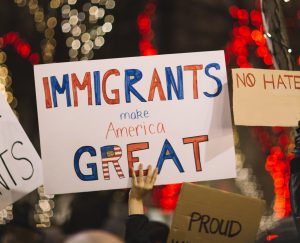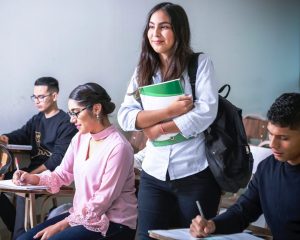Trump’s F1 Visa Ban Brings Trouble for Everyone, Including US Govt.
July 10, 2020
snigdha
F1 Visa, Immigration and Customs Enforcement, M Visa, Trump Administration, US Visa Ban
A day after the US Immigration and Customs Enforcement (ECE) announced that it was going to send international students back to their native country if they are pursuing entirely online course in the US, top academic institutions such as the MIT and Harvard have decided to take the govt body to court. On Wednesday, July 7, the concerned institutions filed a lawsuit in US district court seeking a stay on ECE’s July 6 order.
The ECE order had stated that F (academic) and M (Vocational) visa holder students of only those institutions will be allowed to stay in the US which are offering in-person classes or are following a hybrid model that includes both online and in-person classes. Those students pursuing entirely online course faced the danger of being deported back to their respective countries.
Obviously, this ill-advised move by the Trump Administration will not only jeopardize education and career prospects of foreign students but will also hurt Colleges and Universities financially. According to the US Department of Commerce, international students contribute over $ 44 billion annually to the US economy. A large part of it goes to colleges and universities as tuition and hostel fee. In this blog, Student Cover informs you about this ban and its implications on all stakeholders.
What Does the New Order Banning Students Say?
The order states that:
i. Non-immigrant F1 and M1 students attending schools operating entirely online may not take a full online course load and remain in the US. Neither US Department of State will issue any visa to such students permitting them to come to the US, nor will the Customs and Border Protection department permit them to enter the US soil.
ii. Those students who are currently in United States undertaking such online classes will have to either depart the country or will have to transfer themselves to a school which is providing in-person (offline) instruction.
iii. Non-Immigrant F1 students who are attending schools that are conducting entirely in-person classes will not be affected by this order. They may take a maximum of one class or three credit hours online.
iv. Those schools which are providing both online and in-person tuition must certify to SEVP through I-20, that the student is not taking the entire course online and that he or she is attending, in-person, the minimum number of classes that qualifies them to stay in the US. This they will have to do by providing ‘certificate of eligibility for Non-Immigrant Student Status.’
Implications of F and M Visa Ban
This order will adversely affect all stakeholders including:
US Economy – If this order is fully implemented, it would cause significant financial loss for the US economy as, according to data from US Department of Commerce, international students contributed a whopping $ 44.7 billion to the US economy in 2018-19.
US Colleges and Universities – As mentioned earlier, Colleges and Universities in the US earn a major portion of their revenue from international students. This policy of barring students who are attending entirely online course from entering United States would force academic institutions to reduce their fees as students would be less willing to shell out money for a course that is taught online and doesn’t provide an opportunity to study or work in the US.
US Corporations – US corporations which rely heavily on international students to find skilled and talented professionals to work for them will also lose competitive advantage over their rivals, especially those in countries like Canada, UK, Australia, France, Germany etc. It is worth noting here that currently, from Google to Microsoft, foreign professionals not only constitute a significant chunk of workforce in IT and services sector in the US but, in future, could go to head many fortune 500 companies like Sundar Pichai and Satya Nadella.
Indian Students – Each year, several Indian students go to the US to pursue higher education. This visa ban would severely affect their knowledge and career prospects. This is because, online learning is never a substitute for real in-person education. Moreover, certain streams such as Science, Technology etc. require a student to have practical knowledge in addition to theoretical knowledge. If, due to Covid-19 pandemic, the school is conducting online classes, these students need to spend considerable amount of time in labs to hone their skills. If they are made to return to India, they will be the biggest losers in this.
Lending Institutions – In countries like India, banks and lending institutions lend millions of dollars worth of money to students who go abroad for higher studies. Such students have very low probability of defaulting on education loans as a degree from US ensured a well paying job. This helped students to repay their education loan. With ban on F1 and M category of students, lending institutions will lose on earning opportunities.
What Is The Way Out Of This?
According to an unconfirmed media report published in Economic Times, US Department of Homeland Security now plans to modify its July 6 order and provide relief to foreign students, including 26,000 Indian students, studying in the US. The report states that ‘students would have to report to their respective departments and their embassies now and could continue to live on their F1 and M1 visas until the further decision comes in.’ It also states that, ‘The US administration has not asked them to immediately leave the country. This decision is valid for all the international students and not just the Indian students.’
Moreover, in order to circumvent this order, Universities and Colleges are likely to re-introduce offline (in-person) classes which they had temporarily suspended due to Covid-19 outbreak. Already, several big and small academic institutions in the US have decided to modify their current mode of teaching to include in-person classes so that their students do not have to leave the country.
In the midst of Covid-19 pandemic, this decision by the Trump Administration is deplorable. One may understand President Donald Trump’s compulsion to take populist measures like these to win votes in upcoming presidential election, but these will, in long run would not only affect US economy but also its relations with friendly countries like India.
In Conclusion
The decision by Trump administration to ask students who are pursuing online course from a college or university in the US is regressive and lacks common sense. It not bars students from going to the US but could also force current students to return to India. This decision will adversely affect US Economy, US Corporations, Universities and Colleges and may, in the long run, even severely affect US’s good relations with other countries.
Disclaimer: The content of this blog is based on personal research of the writer. Reader’s discretion is advised. Neither Student Cover nor the writer will be held responsible for any wrongful interpretation of the content of this blog.
Recent Blog Posts

Need help? Chat with us
